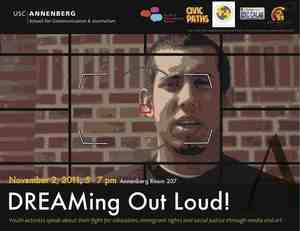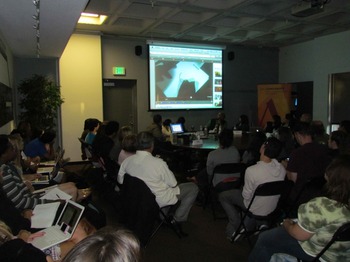DREAMing Out Loud! Youth Activists Spoke About Their Fight for Education, Immigrant Rights and Justice Through Media and Art
/
From time to time, I have show-cased here the work of my Civic Paths Research Team. This is a group of more than a dozen USC graduate students, faculty, staff, and post-docs, who meet each week to research the intersection between participatory culture and political participation. You can check out our blog here. The team is associated with a larger network on Youth and Participatory Politics which has been supported by the John D. and Catherine T. MacArthur Foundation and headed by Joe Kahne from Mills College. We are in the process of doing interviews, media audits, and field work focused on innovative movements and networks which have been effective at using new media and participatory practices to get young people involved in the political process. Over the next few installments, I am going to be showcasing one of those case studies, focused around the efforts of undocumented youth and their allies to rally support around various versions of the Dream Act, which would extend education and citizenship rights. This report was written by Arely Zimmerman, the post-doc who has been primarily responsible for overseeing this case, and Sangita Shresthova, the research director for the Civic Paths Project.
On
November 2, 2011 the Media Activism and Participatory Politics (MAPP) project hosted a
symposium, DREAMing Out Loud! at USC's Annenberg School for
Communication and Journalism. The extremely well attended event emerged out
of a case study on DREAM activism carried out by Postdoctoral Fellow Arely
Zimmerman and brought immigrant youth activists together to share their
perspectives on the intersection of new media, art, and social activism.
These 'dreamers' (as
they are commonly referred to) are members of a national youth-led movement
centered around the Dream
Act, federal legislation
(proposed with bipartisan support) that would provide an opportunity for
undocumented students with "good moral character," who have lived in the U.S.
for a certain period, to obtain legal status. Jacky A., Julio
Salgado, Erick
Huerta, Nancy Meza,
and Pocho 1
represented different local, regional and national youth organizations as well
as different experiences using new media.
(photo: Civic
Paths)
The forum followed two
significant events impacting current debates around the Dream movement. In September 2011,
representing at least a small victory, the state passed a bill known as the California Dream Act -- undocumented youth in the state could obtain some financial aid to
attend college. However, without
any change on the federal level, undocumented youth still cannot work legally
upon graduation. Thus, while the legislation extends state financial aid to undocumented
students, immigrant youth continue to be deported at alarming rates.
Nationally, more undocumented immigrants have been deported under the Obama
administration than under any previous administrations.
Less than a month after the California Dream
Act was passed, on October 12, 2011, five undocumented youth, wearing graduation caps, staged a
sit-in at the Immigration
and Customs Enforcement (ICE) offices in downtown Los
Angeles to urge
the Obama administration to stop deporting undocumented youth (Rojas 2011). The sit-in was launched by the
national Education Not Deportation (END) Our Pain campaign, which is comprised of a network of immigrant youth organizations and
allies demanding an immediate moratorium on deportations of youth eligible for the Dream
Act.
broadcast their action on Ustream, which was followed by 4,000 people. Nancy Meza, one of the panelists, was
one of the protestors arrested at the sit-in. She notes that new media was crucial to the activists'
ability to raise awareness around this event. Confirming the effectiveness of
this new media strategy, the activists were soon invited to a conference call
with key officials of the Obama administration.
youth across the country, connecting local and regional youth organizations,
scaling local movements to the national level, and contesting elite-driven
messaging on immigration policy.
Sangita Shresthova is currently the Research Director of the Media Activism and Participatory Politics (MAPP) Project at USC. She is a Czech/Nepali international development specialist, filmmaker, media scholar, and dancer with extensive interdisciplinary qualitative research experience. She holds a Ph.D. from UCLA's Department of World Arts and Cultures, and a MSc. degree from MIT's Comparative Media Studies program where she focused on popular culture, new media and globalization. She also earned a MSc. in Development Studies from the London School of Economics and Political Science (LSE). While at LSE, her work focused on the educational communication components of international development interventions. Her scholarly writing has been published in several journals, and her work on global participatory aspects of Bollywood dance was recently released as a book by SAGE Publications.
Arely Zimmerman, a Melon Post-Doctorate Fellow at the USC Program for Environmental and Regional Equity, holds a doctorate in political science from UCLA. Her scholarship engages overlapping research areas of U.S. Latino/a studies, race and ethnicity, social movements, transnational, media, and feminist studies. Before joining PERE, she held a postdoctoral appointment at USC's Annenberg School for Communication and Journalism, where she examined how new forms of social and digital media are reshaping modes of civic engagement amongst Latino, immigrant, and undocumented youth. As part of her ongoing concerns with issues of identity and citizenship in transnational contexts, Arely's manuscript in progress, "Contesting Citizenship across Borders: Central Americans in the United States" details Central American migrant communities' struggles for citizenship and inclusion across multiple nation-states through transnational social movement and community activism.



